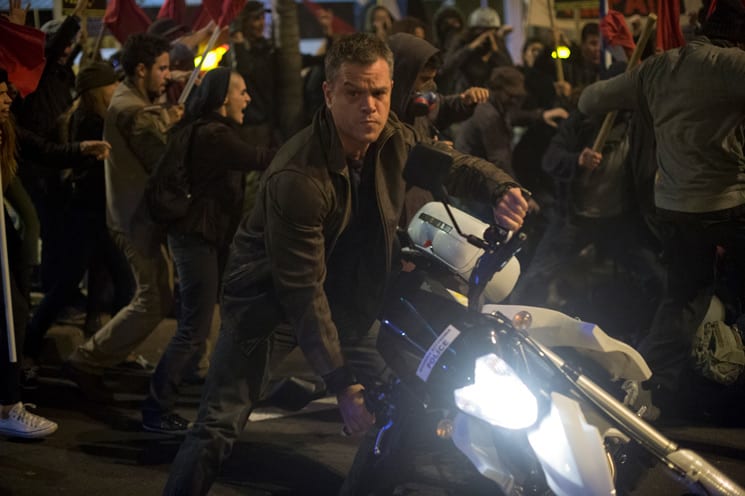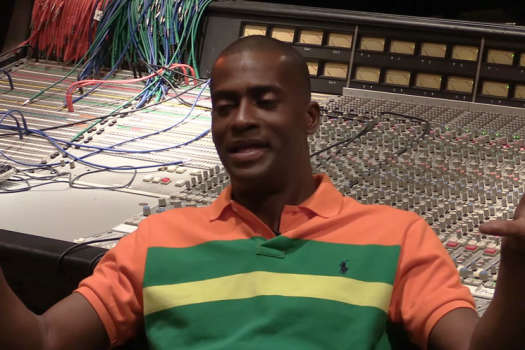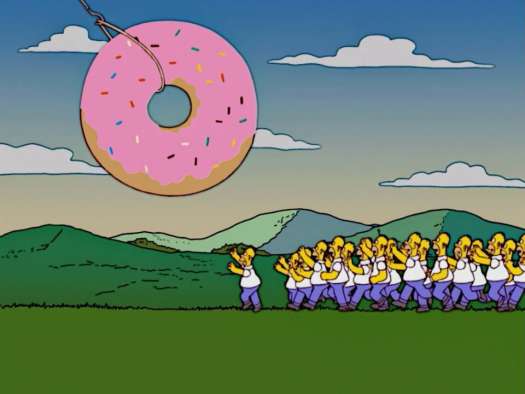Nine years after our man swam away at the end of The Bourne Ultimatum, director Paul Greengrass and Matt Damon are back with Jason Bourne, the fifth entry in the franchise after 2012's disastrous (and Damon-free) The Bourne Legacy. Greengrass and Damon do their best to revive the series, transposing peak 2000s-era Bush paranoia for something a little more global, and that fits better with the present day.
Jason Bourne doesn't hold up to the other entries, awkwardly fumbling its modern themes of surveillance and digital leaks, but still boasts impressive action set pieces that rank among the best of this lousy summer. Greengrass' direction and visual chaos remain a hallmark of the series, and while this new film lacks his elegance, it's not as bad as the pre-release buzz around it would suggest.
While Greengrass was championed in the early 2000s for his social and political realism (expressed most effectively in Bloody Sunday and United 93), he's always had a big taste for Hollywood cheese that undercuts his attempts at sloganeering. This has become more apparent in his recent works, 2010's lesser Green Zone and 2013's overrated, schlocky Captain Phillips. He's still capable of staging some of the most visceral and demanding action sequences today, but he's less the understudy to Michael Mann than we all thought he could be.
The problem with modern-day Greengrass is that his thematic obsessions and visual flair don't line up with his generous approach to character. His films are cynical examinations of "business as usual" capitalism and institutions that destroy the little guy (see the workman-like execution of the pirates by the military in Captain Phillips), but he cares too much about making us like everyone to really pull off effective criticism.
This has never been more evident than in Jason Bourne, a movie that feels like two different stories Greengrass couldn't decide between. The better of the two stories focuses on the decade between the last film and how the tolls of time have been rough for Bourne. We live in a very different world than the one that existed in 2007, and he did not get away easy at the end of the last film. Instead, Bourne's spent his time living in exile, fighting in brutal underground boxing rings to scrape by.
Greengrass admirably goes for a cynical epilogue to what seemed like a happy ending in 2007, and brings a mature and elegiac tone to the proceedings. In terms of character and humanity, this might be one of the most adult blockbusters in years, especially in its approach to violence and the effect it has on people.
Bourne is brought out of hiding when Nicky Parsons (Julia Stiles), his former partner, returns with new information about his past. She's uncovered traces of a previously unknown conspiracy with ties to Bourne's father, and before long, Bourne is on the run and looking for answers. This new plot feels a little unnecessary after the satisfying conclusion we got to Bourne's past in Ultimatum, but works thanks to its lean approach to character.
Bourne's always been an enigma, but at this point, he's all but given up trying to find a sense of inner peace. Instead, Greengrass evokes the harsh and cruel characterizations of Sam Peckinpah's best work to provoke a nihilism that feels truly earned. Damon is better than ever, allowing age to catch up with him, erasing any trace of the baby-faced hero we met back in 2002 with The Bourne Identity. If the film doesn't entirely work, there's a soulfulness to Greengrass' impressionistic filmmaking that makes every new plot twist hurt.
Meanwhile, the B-storyline feels almost completely removed from everything going on with Bourne, an awkward attempt on Greengrass' part to take shots at modern day surveillance and social media. Riz Ahmed plays Aaron Kailoor, a Mark Zuckerberg type who is looking to get into bed with the CIA, as he's meeting in secret with the head of the department, played by Tommy Lee Jones, filling the signature "old white guy" role the series seemingly needs each time around (filled in previously by the likes of Albert Finney and David Strathairn).
Meanwhile, Alicia Vikander leads the new school, playing a brilliant data analyst who undergoes a change of heart as she investigates Bourne's whereabouts. The two storylines never properly meet up, feeling disparate and barely connected before a stunning car chase finale in Las Vegas.
Jason Bourne displays Greengrass' weaknesses more clearly than any other film in his career, and yet, on a thematic level, it's also his most self-reflexive film to date, highlighting what makes him an interesting filmmaker at the same time. So while the new entry in the series doesn't quite work, there's plenty to enjoy, and it sets up further entries quite well. It doesn't completely lift the series into the present day the way it tries to, but it's a solid double instead of a home run. In this weak summer of sequels, that will do.
(Universal)Jason Bourne doesn't hold up to the other entries, awkwardly fumbling its modern themes of surveillance and digital leaks, but still boasts impressive action set pieces that rank among the best of this lousy summer. Greengrass' direction and visual chaos remain a hallmark of the series, and while this new film lacks his elegance, it's not as bad as the pre-release buzz around it would suggest.
While Greengrass was championed in the early 2000s for his social and political realism (expressed most effectively in Bloody Sunday and United 93), he's always had a big taste for Hollywood cheese that undercuts his attempts at sloganeering. This has become more apparent in his recent works, 2010's lesser Green Zone and 2013's overrated, schlocky Captain Phillips. He's still capable of staging some of the most visceral and demanding action sequences today, but he's less the understudy to Michael Mann than we all thought he could be.
The problem with modern-day Greengrass is that his thematic obsessions and visual flair don't line up with his generous approach to character. His films are cynical examinations of "business as usual" capitalism and institutions that destroy the little guy (see the workman-like execution of the pirates by the military in Captain Phillips), but he cares too much about making us like everyone to really pull off effective criticism.
This has never been more evident than in Jason Bourne, a movie that feels like two different stories Greengrass couldn't decide between. The better of the two stories focuses on the decade between the last film and how the tolls of time have been rough for Bourne. We live in a very different world than the one that existed in 2007, and he did not get away easy at the end of the last film. Instead, Bourne's spent his time living in exile, fighting in brutal underground boxing rings to scrape by.
Greengrass admirably goes for a cynical epilogue to what seemed like a happy ending in 2007, and brings a mature and elegiac tone to the proceedings. In terms of character and humanity, this might be one of the most adult blockbusters in years, especially in its approach to violence and the effect it has on people.
Bourne is brought out of hiding when Nicky Parsons (Julia Stiles), his former partner, returns with new information about his past. She's uncovered traces of a previously unknown conspiracy with ties to Bourne's father, and before long, Bourne is on the run and looking for answers. This new plot feels a little unnecessary after the satisfying conclusion we got to Bourne's past in Ultimatum, but works thanks to its lean approach to character.
Bourne's always been an enigma, but at this point, he's all but given up trying to find a sense of inner peace. Instead, Greengrass evokes the harsh and cruel characterizations of Sam Peckinpah's best work to provoke a nihilism that feels truly earned. Damon is better than ever, allowing age to catch up with him, erasing any trace of the baby-faced hero we met back in 2002 with The Bourne Identity. If the film doesn't entirely work, there's a soulfulness to Greengrass' impressionistic filmmaking that makes every new plot twist hurt.
Meanwhile, the B-storyline feels almost completely removed from everything going on with Bourne, an awkward attempt on Greengrass' part to take shots at modern day surveillance and social media. Riz Ahmed plays Aaron Kailoor, a Mark Zuckerberg type who is looking to get into bed with the CIA, as he's meeting in secret with the head of the department, played by Tommy Lee Jones, filling the signature "old white guy" role the series seemingly needs each time around (filled in previously by the likes of Albert Finney and David Strathairn).
Meanwhile, Alicia Vikander leads the new school, playing a brilliant data analyst who undergoes a change of heart as she investigates Bourne's whereabouts. The two storylines never properly meet up, feeling disparate and barely connected before a stunning car chase finale in Las Vegas.
Jason Bourne displays Greengrass' weaknesses more clearly than any other film in his career, and yet, on a thematic level, it's also his most self-reflexive film to date, highlighting what makes him an interesting filmmaker at the same time. So while the new entry in the series doesn't quite work, there's plenty to enjoy, and it sets up further entries quite well. It doesn't completely lift the series into the present day the way it tries to, but it's a solid double instead of a home run. In this weak summer of sequels, that will do.




